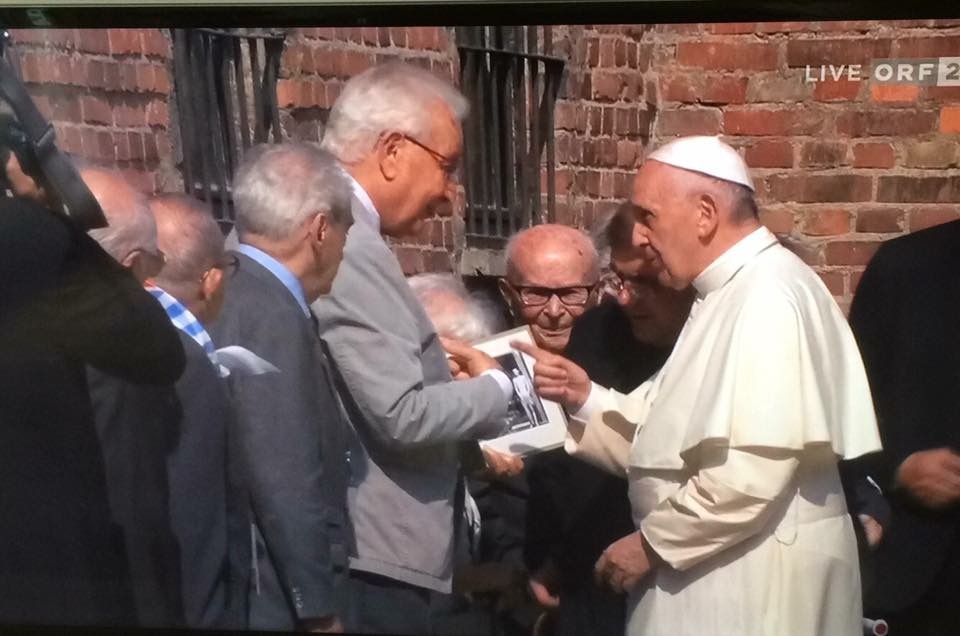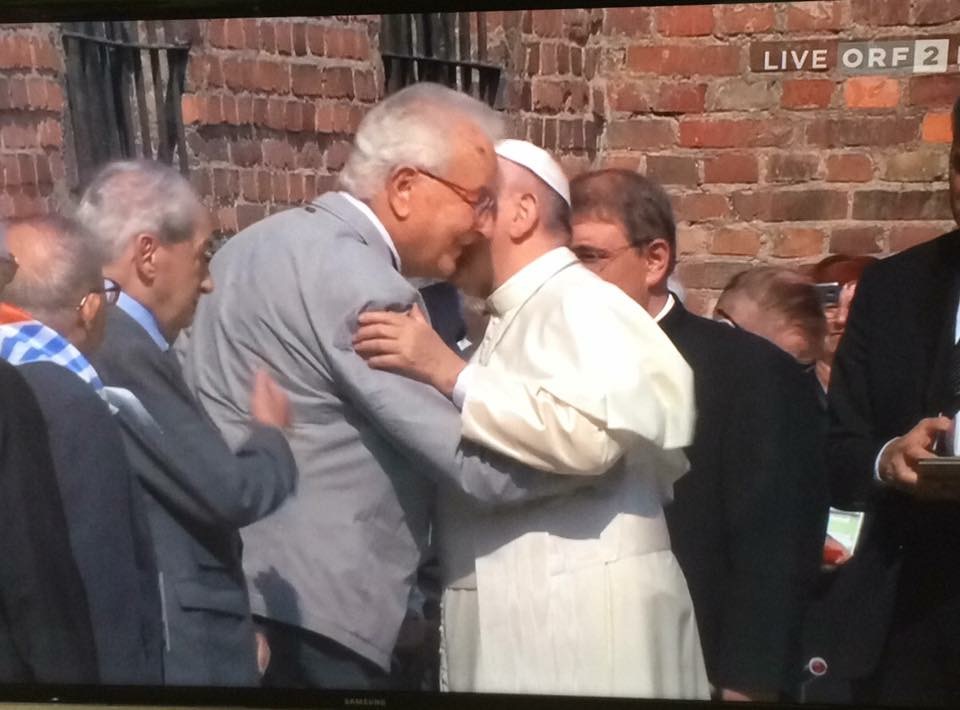LEGGI L’INTERVISTA IN ITALIANO
On Friday the 29th of July, Pope Francis will travel to the site of the Nazi death camp Auschwitz- Birkenau, accompanied by twelve Holocaust survivors. The visit, which is part of the Pope’s inaugural travel to Eastern Europe, will differ from those made by his predecessors, (both Pope John Paul II and Pope Benedict have paid homage to those lost at the camp) as Pope Francis has announced that he will not speak publicly at the camp, but instead will focus on silent prayer.
As word was spreading about the Pope’s upcoming visit, we at La Voce were contacted by the director of a documentary which featured the stories of four men who survived the Holocaust as children, entitled Kinderblock 66: Return to Buchenwald. While interviewing the director, Steven Moskovic, he explained to us that one of the subjects of the film, Naftali Furst, had been chosen as one of the twelve survivors to accompany the Pope on his trip to the death camp. He suggested that we interview Mr. Furst, and put us in contact with him.

Naftali Furst is one of a very few individuals whose entire family survived the concentration camps, and after liberation he was reunited with them. He was born in Slovakia, but after returning from the Holocaust, he eventually moved to Israel with his life partner Tova Wagman, who translated our interview for us. When we reached out to Mr. Furst, he was extremely receptive and open, making time to speak with us on the eve of his departure for Poland. Referring to the opportunity to meet the Pope, he hailed it as the “second miracle of his life.” The following interview is Mr. Furst’s thoughts on his upcoming visit, translated by his partner Tova Wagman during a phone conversation we had with them.
Of all the survivors, why do you think you were chosen to meet the Pope?
“I’m the Representative of the Buchenwald Prisoners, The Committee of Buchenwald Prisoners, and I’m the vice president of the committee. In my past there have been several meetings with the President of Germany and other federal and local officials. I’ve visited Auschwitz several times- people here know me because I was invited before to the ceremony for the 71 years of the liberation of Auschwitz. So last year I was invited by the Museum manager of Auschwitz, who called me again to ask if I want to come to meet the Pope- the answer was ‘of course, it’s a big honour’.”
Other Popes have come to Auschwitz before, but what do you expect particularly from Pope Francis?
“I would expect him to speak against racism and the blood spilled between believers of the various religions in the world. I would expect the Pope to talk against racism and against extremist believers of the religions of the world like ISIS. I would expect him to talk about peace in the world and to talk against fanaticism.”
What are you going to say to the Pope?
“I’m going to tell the Pope that this is the second miracle that I have had in my life here in the same place, Auschwitz. The first one is that I survived there when I was 12 years old, against all the chances I survived. The second one is this meeting with the Pope here in Auschwitz. The second miracle in my life. Because if you think about this it is kind of a miracle, it’s something very very unexpected. The person, and the place”.
Among all of the horrors of the camp, was there anything positive that you experienced? Any sort of friendship, or mutual aid, that made you as a child have hope in humanity?
“Well, I was in several camps. One of the camps was named Budi, near Auschwitz, it belongs to Auschwitz. There, there was a French physician, a doctor, and I would very much like to know his name. He took me under his protection and he helped me to pass a short period in Budi camp. He gave me the belief in man and in humanity. There were several more people like in other camps that helped me in… they were part of the cause that I survived. Also, there was a man named Antonin Kalina, who was imprisoned with me at Buchenwald. He was part of the Communist underground at the camp and was assigned to supervise prisoners by the SS- he risked his life countless times protecting the young boys there. When the camp was liberated, it was discovered that Kalina saved almost 1,000 boys from being worked to death or killed, and the boys there owed him everything.”
How did your experience affect your relationship with religion and faith?
“There is a movie, a documentary movie called Kinderblock 66, that was made by Stephan Moskovic, and in this film I said that I lost faith in God in the camp, in Auschwitz, because no one came. It was the beginning of my time in Auschwitz and I was desperate and I was in the latrine where people… like toilets but an open latrine, an open restroom, and I was alone and I said “I’m going to curse God, and what will be, will be.” And I cursed God with all the curses that I knew at that age. And then I waited for the punishment and nothing happened. And I said at that moment, exactly at that moment, I lost the faith in God, and the faith that someone like God is coming to help me. Will come to help me. So, because of what I saw, because of what I experienced, as I said, I mentioned in the movie, I lost the faith. And I’m still atheist today.”
So you never recuperated, you never…
“No.”
You’re not religious anymore? In your life?
“No, never.”
Do you think genocide is still a present danger today? And where?

“Genocide: this is a very real danger. Because you know, what we see around us, today… it’s a big risk for all. We should not let fanaticism win, we should not be passive and neutral, and as my partner Tova said also in the movie, that when good people are passive, bad people win the war”.
Israel doesn’t seem as concerned about the danger of ISIS as they have been about Iran. Do you think Israel should recognize ISIS as more of a vital threat?
“You are talking about what you hear and what you know, but I don’t know much more than you. I assume that Israel is very concerned about ISIS, and I’m sure the government is discussing and learning about it, I’m sure if they don’t do so openly maybe they have a reason. But you know that we live in the middle of extreme religious war, and you know we have a very dangerous neighborhood where we live, all around us- Egypt, Libya, Tunisia, Lebanon, Syria, Saudi Arabia, and of course we are among the Palestinians that don’t want to make any agreement with us. They expect us to leave the country and go back to Europe, after we built a beautiful country.”
Have you been following American politics now? What do you think about Donald Trump and Hillary Clinton?
“We are interested like other people, not extremely interested.”
Because some people here in America have been saying that Trump represents the kind of danger that there was in Europe 70 years ago.
“Could you repeat the question?”
Sure! They say here, some writers have been in some debates, some discussions, and have been saying that what’s happening in America today, with the candidacy of Donald Trump, is similar to what happened in Germany in the thirties. Trump is popular because he really addressed the fears of the people and made himself very strong and popular this way- some are saying that that’s the way Hitler got into power. So our question is directed to people like you, that went through the horror of the thirties and forties: are you worried about what’s happening today in American politics?
“Well, we are not in such a degree of being worried but uh… you know we are very against fascism and behavior like that. I’m not sure that it’s right that we say anything about this but personally, I believe that if Trump is being elected, it won’t be good for the world. I believe that he’s not qualified to be president of such a nation.”
If there is anything else that you want to tell us about this incredible miracle, this second miracle that is going to happen in Poland, your meeting with Pope Francis in Auschwitz-Birkenau, we are here to listen.
“Well, we expect a very unique experience, a very emotional experience. I will bring the Pope a very special gift, that I prepared for him. I put two pictures of myself in the Buchenwald camp in a very nice cover and I hope that the Pope will accept it from me. People here say ‘you will be the Naftali before the meeting and then you will be the Naftali after the meeting’. We will see, we will see, we are very open to, you know, to feel the experience, this miracle”.











